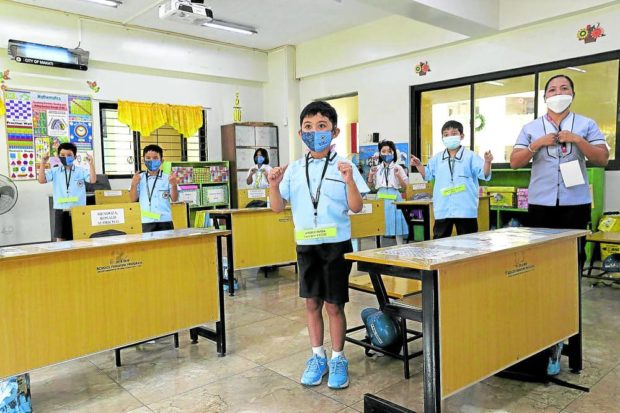
DID YOU MISS ME? With face masks on, Grade 3 pupils at Comembo Elementary School in Makati City ease back into their usual classroom activities during Thursday’s “simulation” of in-person classes, after almost two years of missing each other and their teachers. —RICHARD A. REYES
There will be no plastic barriers when Comembo Elementary School (CES) in Makati City welcomes its students participating in the limited in-person classes on Monday.
Instead, CES, one of the biggest public schools in the city, has decided to go for the “more scientific” air purifiers and ultraviolet C (UVC) lights inside the classrooms to ensure proper ventilation and help protect the children from virus transmission.
Aside from the UVC lights and air purifiers, the school also has automatic thermal scanners at the entrance to monitor the temperature of students before they enter the premises.
Gone in milliseconds
Carleen Sedilla, schools division superintendent, said this was what made CES, as well as the city of Makati, unique among the participating pilot schools in the limited face-to-face classes: their safety protocols are based on science and studies.
Since parents were concerned about the tendency of kids to remove their face masks, Sedilla said, the UVC lights would help in killing the virus in milliseconds while the air purifier would clean the lower area, covering the entire classroom.
Every classroom in the school that would be used in the in-person classes was equipped with the UVC lights and air purifier.
‘Comfortable’
During the simulation test of CES on Thursday, Sedilla told reporters that more schools in the city slated to join the limited in-person classes would be provided with the safety equipment that came from the local government.
“The whole classroom is protected so the children, and even the teacher, would be comfortable and [feel like] it is just a regular classroom setting,” she said
Makati Mayor Abby Binay said the lights and air purifiers would be useful even after the pandemic because they are designed to kill any type of virus as compared to the physical barriers, which would serve no purpose when the health crisis is over.
Pasig City Mayor Vico Sotto has also decided to drop the use of plastic barriers in the classrooms.
The Department of Education (DepEd) has given an advisory on the use of plastic barriers, citing experts’ advice that these could even be harmful.
“One of the inputs from the DOH (Department of Health) is there are also findings that putting up these barriers sometimes it impedes air circulation, and second it also increases surface area that may be contaminated, increases the surface area for disinfection,” Education Undersecretary Nepomuceno Malaluan said in an ANC interview.
DepEd confirmed also on Thursday that some schools from Metro Manila will finally join the pilot study on Dec. 6—three weeks after 100 public schools started on Nov. 15.
Kindergarten to Grade 3CES is one of the biggest elementary schools in Makati, Sedilla said, noting that the low number of COVID-19 infections in the community was among the considerations for its inclusion in the pilot study.
About 72 learners of the school’s 2,464 student population will join the pilot run on Monday. Following DepEd’s guidelines, only Kindergarten to Grade 3 students will take part in the face-to-face classes.
All the school staff from the heads down to the utility personnel are fully vaccinated. Antigen test kits are also available in case the participants exhibit any symptoms during the conduct of in-person classes.
No parents allowed
Parents are not allowed to enter the school premises to avoid convergence. The school has set up a holding area instead where they can pick up their children after classes.
For those who live far from the school, a transportation service from the local government called “Dyipni Maki” will pick up and drop off the students to their respective areas.
Barangay staff and members of the parent-teacher association are assigned to oversee the pickup points of the service.Based on the list released by DepEd, a total of 177 schools will join the pilot run next week, 28 of which are from the National Capital Region.